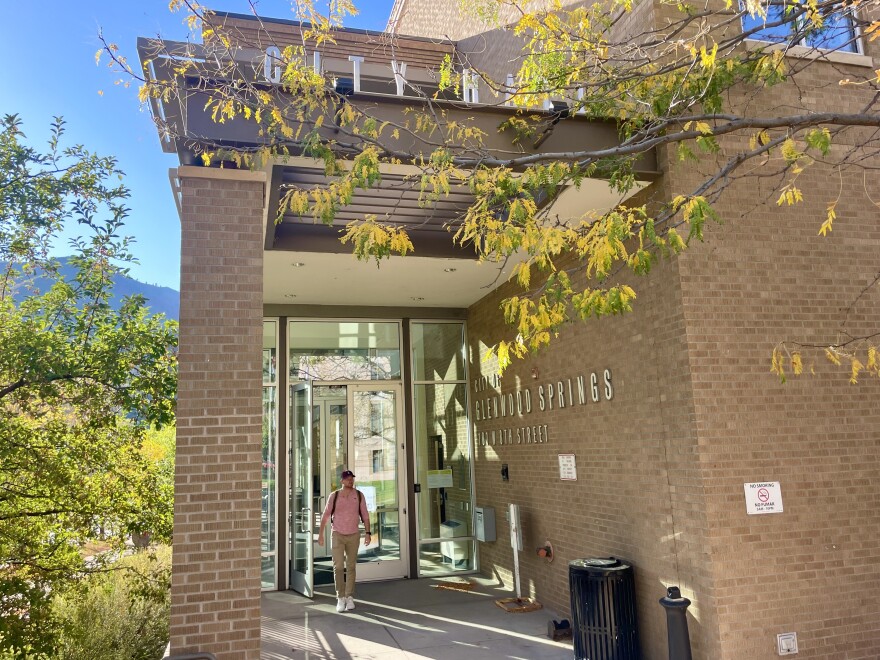Two candidates are vying for a city council seat in Glenwood Springs’ Ward 5, which makes up the southernmost part of the city.
Jon Banks and Steve Smith talked to Aspen Public Radio about solutions for acquiring more affordable housing in Glenwood, down valley’s economic growth and tourism scene and environmental impacts in the Roaring Fork Valley.
Jon Banks has lived in Glenwood Springs for 30 years, where he raised his daughter and is retired from his career doing technical work for radio and TV stations.
He was the leader of the Keep Glenwood Glenwood campaign, a citizen led initiative that grew out of a concern with the city’s growth plans and what he calls the city’s “build-everything-everywhere approach.”
Banks said the campaign also came from a feeling of disconnect between the city council and the people.
“I felt the same thing, that we just had a big disconnect between what our government wanted to do and what the people actually wanted done,” he said.
Banks used the city’s comprehensive plan as an example, where he says, growth and development was mentioned hundreds more times than quality of life. Banks said this felt to him like the city council had its priorities backwards.
Development in Glenwood Springs means more tourism. Tourism is one of the largest city funders, but it also affects the quality of life for the people that live in Glenwood year round with traffic, rising short term rental costs and a generally busier atmosphere in the city.
“It's been a joke forever,” Banks said. “You do not go out for brunch on a three day weekend … Trying to balance that with what the local people need is important. But I think the key thing there is, if we make Glenwood really good for us, it'll be really good for the tourists too.”
If elected to council, Banks said he would want to work with the city’s tourism board on how to better manage fluctuations in tourism in the off and on seasons.
Glenwood Springs, the Roaring Fork Valley and the Western Slope are at the forefront of several different environmental issues, from mines to wildfires.
In February, the city council allocated $1 million of its general fund to continue to oppose the expansion of a limestone mine a mile above the city. The city has also previously allocated funds to the Roaring Fork Valley Wildfire Collaborative for various wildfire fighting projects around the city.
When asked about what initiatives he would support on council or any solutions he would have to the issues, he said:
“I don't know anybody who's against the environment, do you? We all value, treasure what we have here. We all want to protect it. We all want to be able to enjoy it without ruining it.”
His opponent, Steve Smith, said that preserving the natural features is part of the joy of living in Glenwood Springs and that both the local environment and the national environment need attention.
Recently, the city updated its energy and climate action plan, which has tangible reforms in purchasing equipment, monitoring fuel use and making cleaner infrastructure decisions for every department in the city.
Smith said this gives him a cookbook if elected to city council, where he can work with city staff to make decisions for the global environment by starting with smart local choices, like protecting river banks, having sustainable trail networks and making sure basic utilities use clean water management.
“We continue the powerful tradition of currently having 100% renewable energy sources for the Glenwood Springs electric department,” he said. “That we continue to advance those new sources as the demand increases, all of those are going to be good service to how the natural environment works here locally, while doing a big part to help with the global climate crisis.”
For three decades, Smith watched as new neighborhoods were developed on pasture land near his home in what is now Ward 5 of Glenwood Springs.
These changes prompted him to get engaged in city processes to review development proposals, housing designs and transportation connections.
This grew into serving on the city's original river commission, which prioritized cleaning up the two rivers that form the heart of the town. It also worked on hillside preservation to make sure that steep river banks remain undamaged and with natural vegetation.
Most recently, he served on the city's transportation commission. In the last five years, it has focused on projects for cars, bicycles and public transit while generally advising the city council on transportation design policy.
“The first priority is to give all that good care that every decision we make has got to have the visual beauty, the natural ecosystems, the rivers, the planetary climate, all as considerations when we make an individual decision about land use or development or transportation or anything,” Smith said.
When it comes to the economy, new growth and tourism, Smith says he will look at those decisions in the context of what it does to existing communities, whether through housing or commercial developments. He will push for these decisions to be scrutinized from the eyes of residents rather than being approved automatically.
He said the fact that the city has a vibrant tourism scene means that residents also have those benefits for themselves, whether through arts and culture, outdoor spaces or food and drink. And the city enjoys the monetary benefits, like a strong sales tax base.
“Tourism is key to what we love about living here,” he said. “It's important to keep that support because there are other pretty places in Colorado and Utah and other nearby states, they're competing for the folks who want to come here and help us enjoy and pay for a very vibrant community.”
Election Day is April 1.
Two other candidates, Ward 2’s Ray Schmal and at-large David Townsley are running unopposed.



